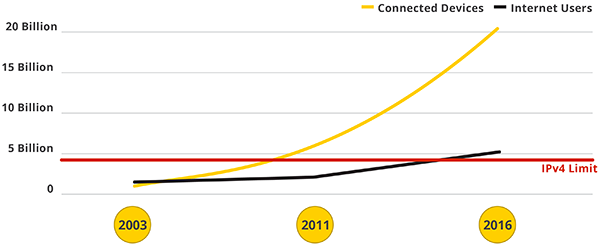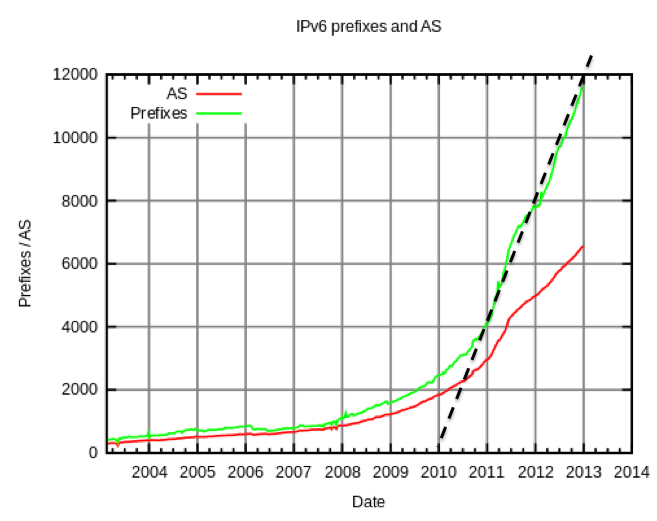(Zero on April 1, 2011) and (1% on Jan 1, 2013)
(Click image for full-size)
The current rate of growth is about 1% of the Internet in 1.75 years.(Zero on April 1, 2011) and (1% on Jan 1, 2013)
(Click image for full-size)
Eyeballing Google's chart here:

There are about 8 billion devices on the Internet now.
Ignoring all other information & corrections, I just multiplied those numbers together to make a really crude & inaccurate estimate of IPv6 growth:
1% of 8 billion in 1.75 yrs = 80 million per 1.75 yrs = 45 million per year
1 year has 31.5 million seconds.
So the current address consumption rate is approximately 2 per second (rounded up from 1.5 per second to make a conservative estimate).
April 1, 2011 + 2^128 addresses / (2 addresses per second)
1 year = 31536000 seconds
2^127 seconds = 1.7014118 x 10^38 seconds = 170141180 x 10^30 seconds
= ( 170141180 / 31536000 ) x 10^30 years
= 5.395 x 10^30 years
= The year 5,395,000,000,000,000,000,000,000,000,000 AD
Adding 2011 is insignificant.
@paulgear1: @tbourke @ecbanks @sambowne The number of IPv6 addresses is irrelevant; the number of /64s is what's significant. How does that counter go?That is a very good point! The current system allocates a block of addresses to each company, and the addresses within the company are expected to remain sparse forever, wasting a vast amount of space.
Not all companies get the same size blocks, either. Originally each company was supposed to get a /48, but now some companies get smaller blocks like /56 or even smaller, and some get larger blocks.
Here's some data from Wikipedia:

I drew a line projecting current growth, connecting these two points:
(Zero on Jan 1, 2010) and (12,000 on Jan 1, 2013)So prefixes are being allocated at a rate of 12,000 in 3 years = 4000 per year
So the projected exhaustion date depends on how large those prefixes are.
Here's a chart showing my estimates of the lower and higher bound of reasonable prefix estimates.
Prefix Size Number of Prefixes Exhaustion Date
----------- ----------------------- ------------------------
/32 4.295 billion 1,076,000 AD
/48 281,500 billion 70,370,000,000 AD
/64 18,450,000,000 billion 4,611,000,000,000,000 AD
So the appropriate counter for the /48 scenario is:
4000 /48 prefixes allocated per year =
4000 / (3.15 x 10^7) prefixes per second =
1.3 x 10-4 prefixes per second
Rounded up: 0.0002 prefixes per second
http://www.google.com/ipv6/index.html
http://en.wikipedia.org/wiki/IPv6_deployment
http://www.rune-server.org/programming/website-development/220502-creating-auto-updating-clock.html